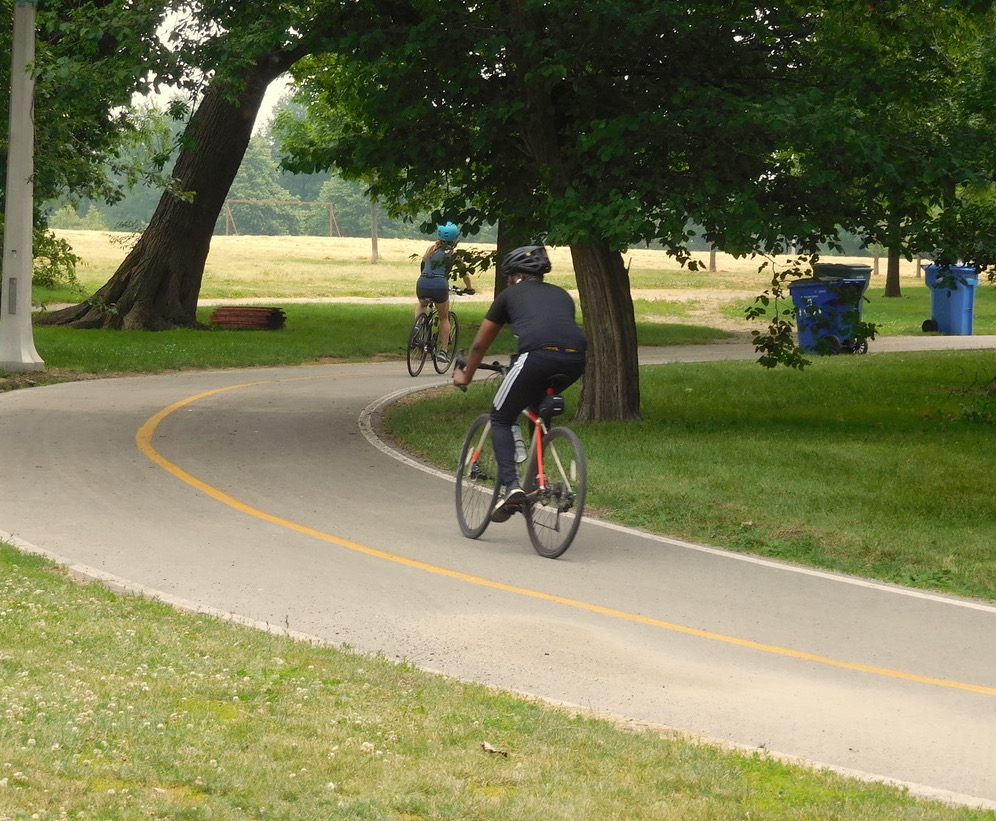Chicagoans celebrated today as the Lakefront Trail, the city's most important car-free transportation and recreation corridor reopened today after almost three months of closure during the the COVID-19 pandemic. On March 26 Mayor Lori Lightfoot abruptly closed the path, along with the Chicago Riverwalk and the Bloomingdale Trail, in the wake of crowding issues on one of the first warm days of spring. The riverwalk reopened earlier this month, although biking, running, and exercise walking is only permitted from 5-10 a.m., and the Bloomingdale also reopened today.
The city’s strategy for reopening the trail employs a couple of ideas that Streetsblog Chicago previously advocated for that have worked well in other cities like Seattle: limiting shoreline access to “Keep It Moving” activities like walking, jogging, and biking; and hiring Social Distancing Ambassadors to encourage compliance with the rules. Path users are required to wear masks or other face coverings and maintain six-foot-plus distance from others when possible.
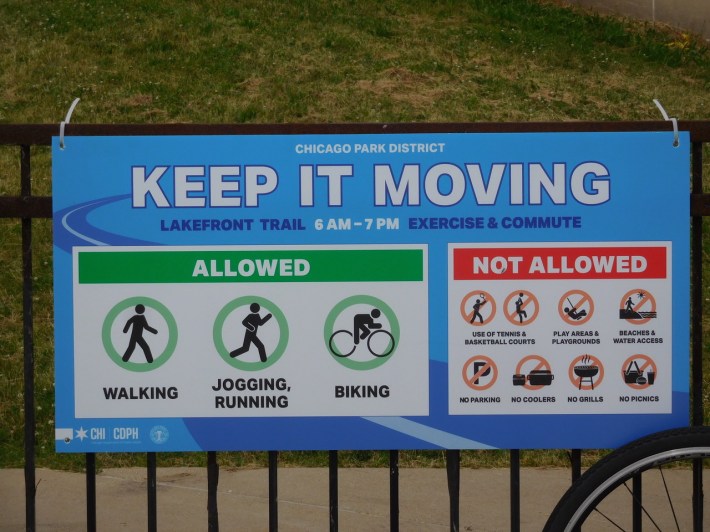
Unfortunately, the Lakefront Trail is only open from 6 a.m. to 7 p.m. each day, which will make it less useful for commuting, and concentrate recreational activity within a narrower timeframe, which could exacerbate crowding issues. Apparently the motivation for the early closing time is to discourage dangerous congregation at the shoreline. Beaches, parkland, and most other non-trail amenities east of Lake Shore Drive remain closed. The mayor's office and the Chicago Park District didn't respond to questions about how the trail curfew will be enforced.
Another obstacle to use is the fact the trail is currently closed between the North Avenue underpass and Grand Avenue. The city hasn't provided a recommended detour for path users, so Streetsblog Chicago put together this route map. The orange route is more direct, while the green one is lower stress.
Many of the trail entrances, mostly on the North Side, are currently closed in an effort to reduce crowding and congregation. See a map of the open and closed entrances here.
Lakefront parking lots, bathrooms and water fountains are still closed, so plan accordingly.
I checked out the trail between Montrose Avenue and North this morning. The Social Distancing Ambassadors, dressed in matching blue t-shirts, were out installing signs with the path rules.
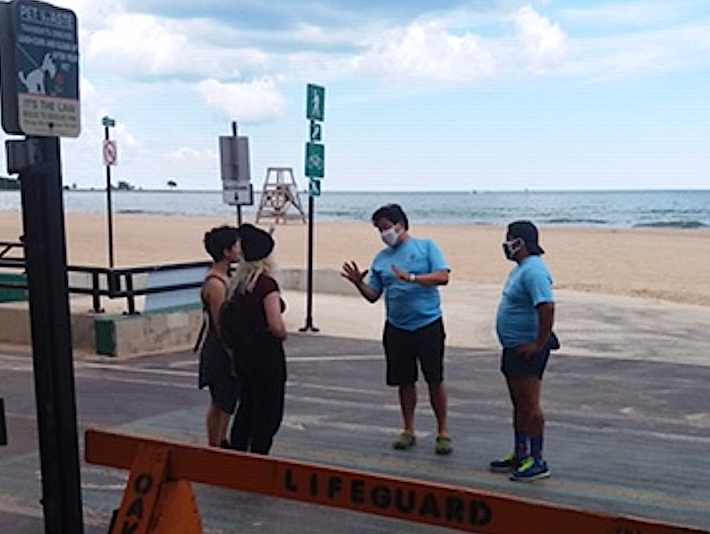
Jen DeSalvo, a reporter for NBC 5 Chicago, who is also an endurance running coach, told me, "I'm an early bird, and my favorite thing to do every June is to start running when the sun starts rising. Frankly, 6:00 a.m. is late for some seasoned athletes. Personally, I would appreciate a 5 a.m. start, but I very much understand."
"The first morning... was graced with athletes," DeSalvo added. "These people know what they're doing. They know how to distance and keep moving forward." However, she said that many trail users she saw were wearing masks, which the Centers for Disease Control says help slow the spread of the coronavirus by blocking respiratory droplets.
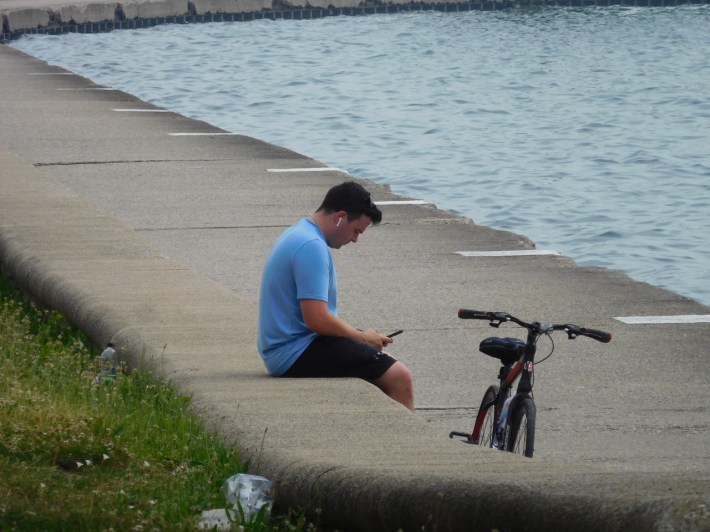
As I rode south, the path was buzzing with users, some wearing masks, others not. Scott, who was walking, told me, "I wish people were more responsible about wearing masks."
Julia, a roller bladder who was stretching near Fullerton Avenue said, "I have mixed feelings about the opening because we will see what people do. The time restrictions work because nothing good happens after dark." Sunset is currently about 8:30 p.m.
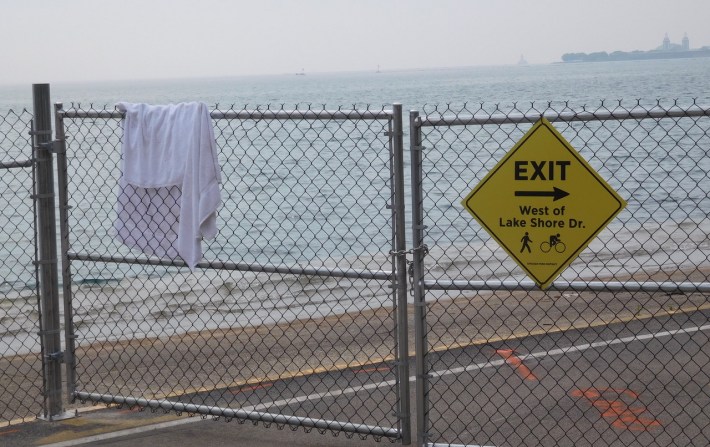
Larry, a cyclist, was annoyed by the fencing erected just south of the North Avenue underpass. "They had three months to do the repairs, so what is the point of opening with disruptions?"
Kyle Lucas, an essential worker and cofounder of the advocacy group Better Streets Chicago, launched a petition to reopen the trail for bike commuters that garnered over 1,625 signatures. He said the 7 p.m. closing time is a problem. "I'm concerned that this will shoehorn people who are working 9-to-5 from home into a narrow window of opportunity [for exercise] and have adverse effects. Additionally, the hours are unreasonable for anyone working in essential jobs – healthcare workers, food-service and grocery workers, retail, and beyond."
Mary, who was taking a walk, agreed that the path should be kept open until at least sunset. However, she said, "I am delighted" that the trail has reopened, period.
